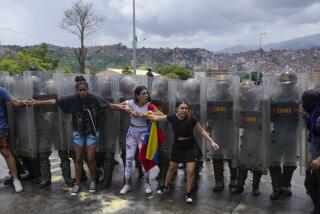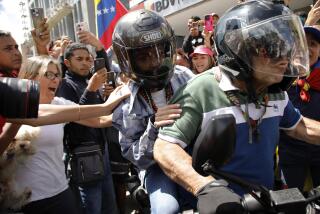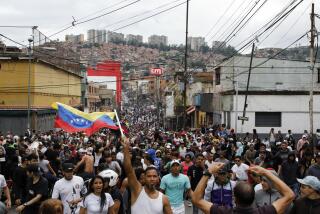Putin Rolls to Victory, Avoiding a Runoff
MOSCOW — Vladimir V. Putin, a former KGB spy who rose from obscurity to become Russia’s acting head of state, defeated 10 other candidates to be elected in his own right, according to returns early today.
With 92.6% of the vote counted in Russia’s second post-Soviet presidential election, Putin received 52.4% and avoided a runoff with the second-place finisher, Communist Party leader Gennady A. Zyuganov.
Speaking to reporters early this morning, Putin attempted to strike a conciliatory note and held out the possibility of cooperating with at least some of his political rivals. At the same time, however, he warned the public that Russia’s problems were complex and that people should not expect changes overnight.
“The level of expectations is really very high,” he said. “I can feel it when I travel across the country and regions. People are really tired. Their life is difficult. And they are waiting for changes for the better. But, of course, miracles don’t happen.”
During the six-week presidential race, Putin spoke largely in generalities and managed to avoid committing himself to a specific plan of action or economic program. Although many people pin high hopes on his ability to strengthen the state and turn around the economy, Putin’s vagueness has left the country uncertain as to what kind of president he will be.
Putin said he will now try to explain clearly what must be done as well as promote public participation.
“We must say bluntly and honestly how we are going to get out from the difficult situation the country is in,” he said. “And I must say to the people directly and clearly that I will be doing this, that and the other.”
Some Russians fear that, after eight years of the country’s experiment with democracy, Putin will become an authoritarian ruler in the long tradition of czars and Soviet dictators. Already, they note, Putin has begun to rebuild the military, exert control over the media and strengthen the secret services.
Zyuganov, who received 29.6% of the vote according to the official tally, charged that the count was rigged and contended that Putin received far fewer votes than election officials were reporting.
“I am sure that if the vote count was honest, there would be a runoff,” the Communist leader told reporters. “I want them to count the votes right and not give us some bogus, farfetched figures. They have become so impudent that they are not embarrassed one bit breaking the law. They know that they will never be held accountable for it.”
Putin, who spent 16 years as a KGB agent, became acting president on New Year’s Eve when then-President Boris N. Yeltsin abruptly stepped down. Yeltsin’s early departure moved up scheduled elections by three months, giving Putin the tremendous advantages of incumbency and a short campaign season.
Putin, who has held the post of prime minister since August, won popularity with his pledge to bring order to Russia and his brutal military campaign to subdue separatist rebels in Chechnya. But there were signs his support was already peaking: some polls conducted more than a week before the election showed he would get as much as 57% of the vote.
Many voters, even some who cast their ballots for him, were uncertain what he stands for.
“I voted for him because I don’t know him,” said Vita Kurochkina, 62, as she left her Moscow polling station. “I know all the rest, and I didn’t want to vote for them.”
Putin, appearing relaxed and confident, said he was pleased that he was able to conduct a successful campaign without overstating what he would do if elected.
“I never even in a bad dream could imagine that some day I would take part in elections--and you shouldn’t laugh,” he told reporters. “I have always thought up to now that it is a totally dishonorable business because you must always promise something and you must promise more than your opponents to look more successful.
“And I couldn’t imagine myself promising something I know I couldn’t deliver. But I must say the way the election campaign was conducted, the way I managed to lead it, saved me from this necessity.”
Ultranationalist and presidential candidate Vladimir V. Zhirinovsky, who finished in fifth place with less than 3% of the vote, predicted that Putin will create his own personality cult and will never be forced from office.
“At least Yeltsin was old and one could have hoped he would die,” Zhirinovsky said. “Putin is young and strong. He will carry on with the same course, and no one will ever unseat him. The time of democracy is ticking away.”
Voter Ninel Nazimova, 68, said she was worried that Putin would bring back the same sort of evil dictatorship that killed her parents, both of whom were shot by the Communists in 1936. She cast her ballot for pro-market liberal Grigory A. Yavlinsky, who finished third with 5.8% of the vote.
“We don’t want to revive the KGB and bring the KGB back to power,” she said. “After they stop killing the Chechens, they will start killing us.”
If Putin owes his victory to one segment of the population, it is the military. Turnout among the 1.2 million members of the armed forces was 97%, compared with 69% among voters as a whole.
And among those in uniform, election officials said, more than 80% voted for Putin.
“I am a serviceman, and his attitude toward the military is very appealing to me,” said Denis Osipov, 22, a recent graduate from military academy who voted for Putin. “I like the strong hand in the Chechen campaign.”
Despite Zyuganov’s claims of vote fraud, his showing was stronger than many analysts had predicted. Putin called the vote for Zyuganov a protest vote and said the country must respond by improving the lives of its citizens. He noted that the Communists’ showing was especially large considering they do not control any major media outlet to help them deliver their message.
“It means that there is a big part of the population of Russia dissatisfied with the current situation,” Putin said. “This shows that the policy of the authorities should be more balanced--and should be directed at raising the real living standards of ordinary people.”
Another option for voters to express their dissatisfaction was to cast their ballots against all the candidates. This category took sixth place with 1.9% of the vote.
However, the estimated 69% of Russia’s 108 million eligible voters who cast ballots in the election easily satisfied the required turnout of 50% for the election to be valid, election officials said.
Even as fighting raged in parts of Chechnya, the government set up 336 polling places in the Russian-occupied part of the territory, including mobile polling stations that were sent to serve voters in populated mountain areas. Officials estimated that 450,000 people would vote, but it was unclear how many Chechens cast ballots.
Putin said he was especially pleased that people voted in the breakaway republic, which claimed independence from Russia a decade ago.
“That the people of the republic voted in this presidential election demonstrates that an overwhelming majority of the Chechen people perceive themselves and perceive their republic as part of the Russian Federation,” he said. “This is very important and can’t help but bring joy.”
Russian fighter planes and attack helicopters flew 40 sorties Sunday morning as fighting continued in the mountainous southern region of the republic. Despite threats by the rebels to disrupt the election, the government reported no attacks on polling places.
Although Putin was selected by Yeltsin and his first act in office was to grant the former president immunity from prosecution, his campaign aimed at distinguishing Putin from the ailing and discredited former president.
Putin staged frequent appearances that emphasized his youth and vigor--Putin skiing, Putin performing judo, Putin helping to fly a fighter plane. Although the two met occasionally and talked by telephone during the campaign, Yeltsin remained largely out of public view.
After casting his vote Sunday morning, Yeltsin told reporters that Russians are “pinning great hopes” that the next president will lead the country out of its present morass.
Yeltsin only hinted that he had voted for Putin, saying, “I think you can guess for whom I have cast my ballot.
“Everyone is waiting for change,” the former president said. “Of course, changes will take place. But the most important thing is that the course of reforms must be preserved. And it will be preserved, I’m sure.”
For some, it remains a jarring idea that a onetime KGB officer will succeed Yeltsin--the onetime pro-democracy leader who climbed on top of a tank in 1991 to rally Russians against a hard-line Communist coup.
“If somebody had said in 1991, after the [abortive] putsch, that our next president would be a KGB officer, he would be definitely regarded as an idiot,” said journalist Alexander Minkin.
Sergei Loiko and Alexei Kuznetsov of The Times’ Moscow Bureau contributed to this report.
More to Read
Sign up for Essential California
The most important California stories and recommendations in your inbox every morning.
You may occasionally receive promotional content from the Los Angeles Times.










